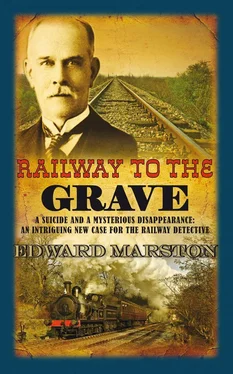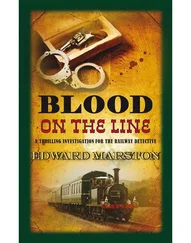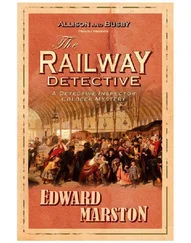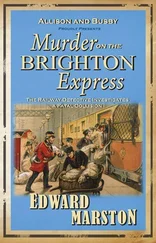Edward Marston - Railway to the Grave
Здесь есть возможность читать онлайн «Edward Marston - Railway to the Grave» весь текст электронной книги совершенно бесплатно (целиком полную версию без сокращений). В некоторых случаях можно слушать аудио, скачать через торрент в формате fb2 и присутствует краткое содержание. Жанр: Исторический детектив, на английском языке. Описание произведения, (предисловие) а так же отзывы посетителей доступны на портале библиотеки ЛибКат.
- Название:Railway to the Grave
- Автор:
- Жанр:
- Год:неизвестен
- ISBN:нет данных
- Рейтинг книги:5 / 5. Голосов: 1
-
Избранное:Добавить в избранное
- Отзывы:
-
Ваша оценка:
- 100
- 1
- 2
- 3
- 4
- 5
Railway to the Grave: краткое содержание, описание и аннотация
Предлагаем к чтению аннотацию, описание, краткое содержание или предисловие (зависит от того, что написал сам автор книги «Railway to the Grave»). Если вы не нашли необходимую информацию о книге — напишите в комментариях, мы постараемся отыскать её.
Railway to the Grave — читать онлайн бесплатно полную книгу (весь текст) целиком
Ниже представлен текст книги, разбитый по страницам. Система сохранения места последней прочитанной страницы, позволяет с удобством читать онлайн бесплатно книгу «Railway to the Grave», без необходимости каждый раз заново искать на чём Вы остановились. Поставьте закладку, и сможете в любой момент перейти на страницу, на которой закончили чтение.
Интервал:
Закладка:
‘When will you be seeing him again, Maddy?’ he asked.
‘I don’t know,’ she replied.
‘I called on your mother regular before we were married. It’s what men are supposed to do when they’re betrothed.’
‘Robert is a very busy man. According to the note he sent me yesterday, he had to catch a train to Yorkshire.’
‘Yorkshire!’ said Caleb Andrews with disgust. ‘That means he’ll have travelled on the Great Northern Railway. I wouldn’t use one of their trains if you paid me.’
‘It has a good reputation.’
‘The only company worth its salt is the one I work for.’
‘Mr Brunel would have something to say about that.’
‘You can forget him, Maddy. The Great Western Railway is a complete mess. Brunel can’t even use a proper gauge on his track. As for the GNR, it’s in an even worse state.’
Having worked for the London and North Western Railway since it came into existence, Andrews treated its competitors with routine contempt and he was always annoyed when Colbeck’s work took him on lines operated by its rivals. Madeleine continued eating her breakfast in amused silence. She knew better than to argue with her father because it would only prolong his attack on other railway companies. Her task was to feed him well at their little house in Camden before sending him off to Euston on the early shift.
Short, wiry and with a wispy beard, Andrews was a man of truculent disposition. Workmates feared his sharp tongue and took care not to provoke him. His daughter, however, had learnt how to cope with his irascibility and had been a tower of strength to him since the death of his beloved wife. Andrews was very conscious of what she’d done for him over the years.
‘I’ll miss you, Maddy,’ he said, munching some bread.
‘I haven’t gone yet, Father,’ she pointed out, ‘and it may be some time before I do so. Robert warned me about that.’
‘Sooner or later, you’ll be off. I won’t have to worry about you.’
She smiled. ‘I thought I was the one worrying about you.’
‘I can look after myself. And now that you’re settled, I can start thinking about retirement.’
‘You’ll never retire. The railway is in your blood.’
‘It’s in my lungs as well,’ he said, coughing and beating his chest by way of testimony. ‘That’s what you get for breathing in smoke all day long. I’m not as young as I was, Maddy. I can’t go on for ever.’
‘You wouldn’t know what to do with yourself if you retire.’
‘I’ll find someone I can beat at draughts.’ They shared a laugh. Ever since he’d taught her the game, she’d been able to win against him nine times out of ten. ‘Who knows?’ he added, mischievously. ‘I might even consider walking down the aisle myself.’
She was shocked. ‘You’d get married at your age?’
‘I need some companionship. Oh, I know you think that I’m sinking slowly into dotage but there are still certain ladies who’d look upon me as a catch. You should see some of the warm glances they give me in church.’
‘That’s the last place you ought to be getting glances of any kind,’ she said with mock disapproval.
‘London is full of desirable women.’
‘Father!’
‘All that I have to do is to take my pick.’
‘What you have to do is to remember how old you are.’
‘Many a good tune played on an old fiddle.’ Cackling wickedly, he got up from the table, downed the remains of his tea in one mouthful and beamed at her. ‘You’d better tell Inspector Colbeck to get a move on,’ he said, ‘or I’ll be hearing wedding bells before he does. Make him name the day, Maddy.’
‘I’ll do nothing of the kind,’ said Madeleine, firmly. ‘Robert’s work comes first and we have to plan our lives around that. And I don’t care which railway company took him to Yorkshire as long as it brings him safely back home to me.’
Breakfast at the Black Bull was served in a little room adjoining the kitchen. The food was good, the portions generous and the tea exceptionally strong. Colbeck tried to make conversation but Tallis was distrait. After a sleepless night, agonising over the death of his friend, he looked pale and weary. The visitor brought him fully awake. They were just about to leave the table when the Reverend Frederick Skelton burst into the room like an avenging angel.
‘I am the rector of St Andrew’s Church,’ he declared, striking a pose, ‘and I understand that you are here in connection with this ugly stain that’s been left on the village.’
‘We’re here to look into the circumstances of Colonel Tarleton’s death,’ said Colbeck, levelly, ‘and to find his missing wife. We’ve yet to notice any stains here, ugly or otherwise.’
‘That’s because you don’t have to live here, sir.’
The rector was a tall, slim, thin-lipped man in his forties with a smooth, colourless face and flowing brown locks of which he was so inordinately proud that he stroked them as if caressing a favourite cat. Sizing him up, Colbeck introduced himself and Tallis. Skelton went on the attack at once.
‘I wish to make one thing crystal clear,’ he boomed, addressing an invisible congregation. ‘There is no place for that criminal in my churchyard. He does not deserve to lie in consecrated ground.’
‘That’s a matter for the archbishop to decide,’ said Tallis.
‘I’m in charge of what happens in my parish.’
‘Colonel Tarleton is not a criminal.’
‘Suicide is a crime, Superintendent. Surely, a man in your position must know that. There was a time when those who took their own lives were buried on a public highway with a stake through their bodies. If it were left to me, that practice would be revived.’
‘Fortunately,’ said Colbeck, sharply, ‘it is not left to you or to anyone else enamoured of such medieval brutality. Parliament has shown due mercy to those unfortunate people compelled by the sheer misery of their lives to commit suicide. The Burial Act of 1823 gives them the right to lie in consecrated ground as long as the body is interred between the hours of nine o’clock in the evening and midnight. What the Act does not authorise is the performance of any of the rites of Christian burial.’
‘I care nothing for the Act,’ said Skelton, dismissively.
‘Then it will give me pleasure to arrest you for contravening it,’ said Tallis, wagging a finger. ‘You have a very short memory, sir. The church of St Andrew, as I recall, was rebuilt almost ten years ago. I know that the major costs were borne by Mr Rutson of Newby Wiske, but a handsome donation to erect a stone cross in the churchyard came from my good friend, Colonel Tarleton. Is that not so?’
‘Yes, it is, but I regard that as irrelevant.’
‘He worshipped regularly in your church.’
‘All the more reason for him to set a good example to the rest of my flock,’ said the rector. ‘Instead of that, he causes distress in the mind of every true Christian by his abominable act.’
‘Is suicide always abominable?’ asked Colbeck.
‘It’s abominable and unforgivable.’
‘Then I’m surprised that you haven’t been to Westminster Abbey to open the tomb of Viscount Castlereagh. He slit his own throat with a letter opener yet he was given a Christian burial there. He was a peer of the realm and held some of the highest offices of state. Would you have him disinterred so that he could lie beneath a public highway with a stake through his body?’
‘That was a different case,’ said Skelton, irritably, ‘and bears no parallel to this one. Viscount Castlereagh, poor man, committed suicide in a fit of madness. That’s an extenuating factor.’
‘Could it not also be an extenuating factor here?’
Читать дальшеИнтервал:
Закладка:
Похожие книги на «Railway to the Grave»
Представляем Вашему вниманию похожие книги на «Railway to the Grave» списком для выбора. Мы отобрали схожую по названию и смыслу литературу в надежде предоставить читателям больше вариантов отыскать новые, интересные, ещё непрочитанные произведения.
Обсуждение, отзывы о книге «Railway to the Grave» и просто собственные мнения читателей. Оставьте ваши комментарии, напишите, что Вы думаете о произведении, его смысле или главных героях. Укажите что конкретно понравилось, а что нет, и почему Вы так считаете.












